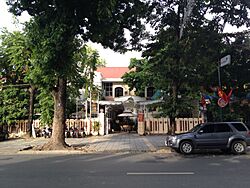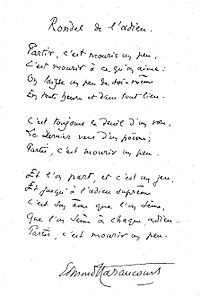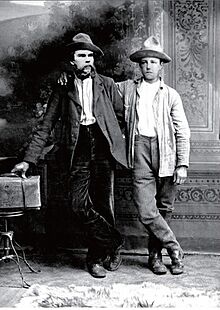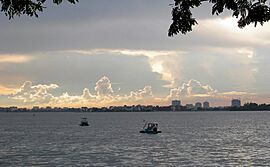Xuân Diệu facts for kids
Quick facts for kids
Xuân Diệu
|
|
|---|---|
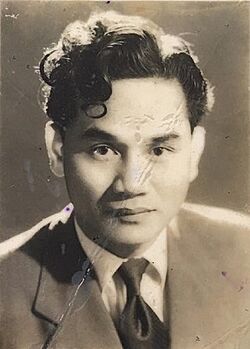
Xuân Diệu in his youth.
|
|
| Born | February 2, 1916 Phước Hòa Commune, Tuy Phước District, Bình Định, French Indochina |
| Died | December 18, 1985 (aged 69) Hanoi, Vietnam |
| Resting place | Mai Dịch Cemetery, Hanoi, Vietnam |
| Pen name | Xuân Diệu, Trảo Nha |
| Occupation | Poet, journalist, literary critic |
| Language | Vietnamese |
| Nationality | Vietnamese |
| Period | 1936–1985 |
| Literary movement | Thơ mới |
| Notable works |
|
| Notable awards | Ho Chi Minh Prize |
Xuân Diệu (born Ngô Xuân Diệu, February 2, 1916 – December 18, 1985) was a famous Vietnamese poet and writer. He was a key figure in the Thơ mới (New Poetry) Movement of the 20th century. Critics called him "the newest of the New Poets."
Xuân Diệu became well-known with his poetry collection Thơ thơ (1938). His early poems showed a strong desire for love and to enjoy the world's beauty. After 1945, his writing changed. He focused on supporting the Vietnamese Communist Party and Vietnam's fight for independence. By the time he passed away in 1985, he had written about 450 poems. He also wrote short stories, essays, and literary reviews.
Contents
Xuân Diệu's Early Life
Ngô Xuân Diệu was born in Gò Bồi, a village in Bình Định Province. This was his mother's hometown. His father was Ngô Xuân Thọ, and his mother was Nguyễn Thị Hiệp. In Vietnam, a child's official hometown is usually their father's. So, his official hometown was Trảo Nha village in Hà Tĩnh Province. Later, he used "Trảo Nha" as a pen name.
Xuân Diệu lived in Tuy Phước District until he was eleven. Then, he moved south to study in Quy Nhơn.
Starting His Writing Journey
In 1936, Xuân Diệu went to Khải Định high school in Huế. There, he met another young poet, Huy Cận. He finished school in 1937. After that, he moved to Hanoi to study law.
In Hanoi, he joined the Self-Strengthening Literary Union. This group had many young Vietnamese writers. They knew a lot about both Vietnamese and Western literature. Xuân Diệu joined them later, but the group was already very important. They published popular romance novels and stories that made fun of society and the French government.
Critics said Xuân Diệu was inspired by Western romanticism. But he brought readers back to the real world. They saw influences from famous French writers like Charles Baudelaire. They believed he was a top Vietnamese poet influenced by French styles.
Writing During the First Indochina War
From 1938 to 1940, Xuân Diệu lived in Hanoi with his friend, poet Huy Cận. In September 1940, Japan entered French Indochina. Many writers in Xuân Diệu's group started focusing on politics.
Near the end of 1940, Xuân Diệu left Hanoi to work as an official in Mỹ Tho. Some of his friends from the literary group were arrested by the French. This was the start of the group breaking apart.
When Xuân Diệu returned to Hanoi in 1942, many writers had changed. They were thinking about joining the fight for independence. This movement was led by Ho Chi Minh. Xuân Diệu became a full-time writer for two years. Then, in 1944, he joined the revolutionaries in Việt Bắc. He did not fight on the front lines. Instead, he wrote to support the independence movement.
After the War
After the Việt Minh won in 1954, Xuân Diệu returned to Hanoi. He continued to publish poems and work as a journalist. In 1956, he married Bạch Diệp, a director. But they separated quickly. Bạch Diệp later remarried. Xuân Diệu lived alone in an apartment. It was right above the house of Huy Cận, his friend. Huy Cận was married to Xuân Diệu's younger sister.
Between 1955 and 1958, Xuân Diệu was part of a big discussion among writers. This was called the Nhân Văn-Giai Phẩm affair. After the war, some government changes had problems. So, some writers who supported the government started asking for more freedom to speak. They wanted to criticize the government's mistakes.
The government admitted some errors. But the discussions grew into strong criticisms. This caused disagreements between writers who supported the government and those who wanted big changes. Xuân Diệu, along with Huy Cận, supported the government. He wrote that some writers were too focused on themselves. He believed they were trying to harm Vietnamese writing.
Later Years and Mentoring Young Writers
As tensions grew before the Vietnam War, Xuân Diệu kept writing. He supported the communist efforts against the U.S. and South Vietnamese forces. He also translated works by writers from other countries.
In the late 1950s and 1960s, he started writing literary analysis. He explored the meaning of classic Vietnamese poets. These included Nguyễn Du and Hồ Xuân Hương. He called Hồ Xuân Hương "the Queen of Nôm poetry." This name is still used today.
In his last twenty years, Xuân Diệu helped young writers. In 1961, he wrote Conversation with Young Poets. This book gave advice to new writers. He wanted Vietnamese poetry to grow. When a ten-year-old boy named Trần Đăng Khoa showed great talent in poetry, Xuân Diệu went to meet him. He even helped proofread Khoa's first poetry book. Khoa later said that Xuân Diệu mentored him as he grew up. He helped Khoa change his writing style.
Xuân Diệu's Death
On December 18, 1985, Xuân Diệu died suddenly from a heart attack at his home. His lifelong friend, Huy Cận, was traveling. He asked for the funeral to be delayed. But the funeral happened soon after. Many Vietnamese artists attended, including his ex-wife Bạch Diệp. Xuân Diệu was buried in Mai Dịch Cemetery in Hanoi.
Xuân Diệu's Works
Xuân Diệu was a very active writer. He left behind many poems, short stories, notes, and essays. His two main poetry books are Thơ thơ (1938) and Gửi hương cho gió (Casting Fragrance to the Wind, 1945). His only published short story collection is Phấn thông vàng (Gold Pine Pollens, 1939).
Poetry Style and Themes
Xuân Diệu's writing style and French influences are clear in Thơ thơ (1938). The title Thơ thơ is interesting. "Thơ" can mean "poetry" or "young." So, it could mean "young poetry" or "poetic poetry." Both ideas fit the book. It celebrates youth and life's glory. It uses symbolic images and many poetic tools.
Here is a famous part from his poem "Yêu" ("Love"):
- Love is just a little bit of death in the heart,
- For how often can one love in certainty that love will be returned?
- Giving so much love, and receiving so little of it;
- Because people are fickle, or indifferent? Who knows?
The first line was inspired by a French poem. The poem "Rondel de l'adieu" by Edmond Haraucourt says: "Partir, c'est mourir un peu" (To leave is to die a little). The lines show the speaker's sadness about love. They also show a fear of being disappointed.
In "Vội vàng" ("In Haste"), Xuân Diệu talks about time passing too quickly. He worries that nature does not keep people young forever. This poem is taught in Vietnamese high schools.
In his introduction to Gửi hương cho gió (1945), Xuân Diệu wrote:
- Perched on a branch, the bird longs for its brook—
- it will break into song and not know why.
- Its ditties cannot make the fruits grow ripe;
- its carols cannot help the flowers bloom.
- It's profitless to sing, and yet the bird
- will burst its throat and heart to sing its best.
Critics said Xuân Diệu's lively poems showed the spirit of Vietnamese youth. These young people were seeing a huge new world. They also felt the sadness of the universe and human fate. Facing these big feelings, the young man chose to hold onto love.
After the August Revolution in 1945, his poems changed. They focused on praising the struggles of the people. He also wrote about Ho Chi Minh's independence movement. Like many writers then, he felt "enlightened." He found a new purpose in life. He helped start the Vietnam Writers' Association and the Journalists' Association. His writings after the war showed his support for Marxism-Leninism.
Xuân Diệu's Personal Life
Xuân Diệu was a private person. Most stories about his life come from his friends. He shared a house with his friend Huy Cận from 1938 to 1940.
Legacy and Recognition
In their important book Thi nhân Việt Nam (1932–1941), critics Hoài Thanh and Hoài Chân wrote about Xuân Diệu. They said that at first, Vietnamese writers were surprised by his French-influenced poetry. But they soon saw that his elegant style also had something truly Vietnamese. They were all charmed by him.
Xuân Diệu's new voice had a big impact on modern Vietnamese literature. He received the Hồ Chí Minh Prize in 1996. Many of his poems have been turned into songs. Poems like "Đây mùa thu tới" ("Here Comes Autumn") and "Vội vàng" ("In Haste") are part of the official literature lessons for Vietnamese high school students.
A special hall was built to honor him in his home village of Trảo Nha. Many roads and streets are named after him. This includes a street in Quy Nhơn and a street near the West Lake in Hanoi. This area has streets named after other famous Vietnamese artists.
Xuân Diệu's love poetry is still loved today. Especially his poems in Thơ thơ and Gửi hương cho gió. He is called "the King of Love Poetry" (ông hoàng thơ tình). This is similar to the name he gave to the 18th-century poet Hồ Xuân Hương. In his own book Chân dung và đối thoại (1998), the poet Trần Đăng Khoa shared a quote from his mentor:
"The writer exists in his works. Without his works, the writer might as well be dead."
Major Works
Poetry Collections
- Thơ thơ (1938) – 46 poems
- Gửi hương cho gió (Casting Fragrance to the Wind, 1945) – 51 poems
- "Ngọn quốc kỳ" ("The National Flag", 1945) – a long poem
- Dưới sao vàng (Under the Yellow Star, 1949) – 27 poems
- Ngôi sao (The Star, 1955) – 41 poems
- Riêng chung (1960) – 49 poems
- Mũi Cà Mau – Cầm tay (Cape Cà Mau – Holding Hands, 1962) – 49 poems
- Tôi giàu đôi mắt (1970) – 23 poems
- Thanh ca (1982)
- Tuyển tập Xuân Diệu (1983)
Short Story Collection
- Phấn thông vàng (Gold Pine Pollens, 1939) – 17 short stories
Essays and Literary Analysis
- Những bước đường tư tưởng của tôi (My Ideological Footsteps, 1958) – his memories
- Ba thi hào dân tộc (Three Great Poets of the People, 1959) – analysis of Nguyễn Trãi, Nguyễn Du, and Hồ Xuân Hương
- Hồ Xuân Hương bà chúa thơ Nôm (Hồ Xuân Hương, the Queen of Nôm Poetry, 1961)
- Trò chuyện với các bạn làm thơ trẻ (Conversation with Young Poets, 1961) – essays
- Thi hào dân tộc Nguyễn Du (Nguyễn Du, the Great Poet of the People, 1966) – notes and essays
- Thơ Trần Tế Xương (The Poetry of Trần Tế Xương, 1970)
- Đọc thơ Nguyễn Khuyến (Reading the Poetry of Nguyễn Khuyến, 1971)
- Các nhà thơ cổ điển Việt Nam (Classical Poets of Vietnam, 1981, 1982) – two books of literary analysis
 | Selma Burke |
 | Pauline Powell Burns |
 | Frederick J. Brown |
 | Robert Blackburn |


